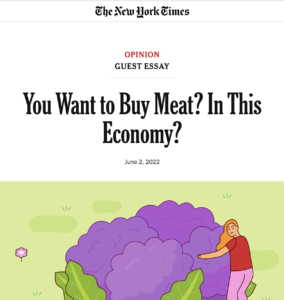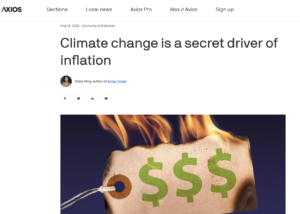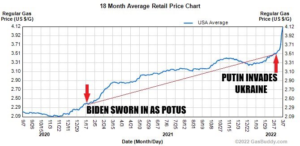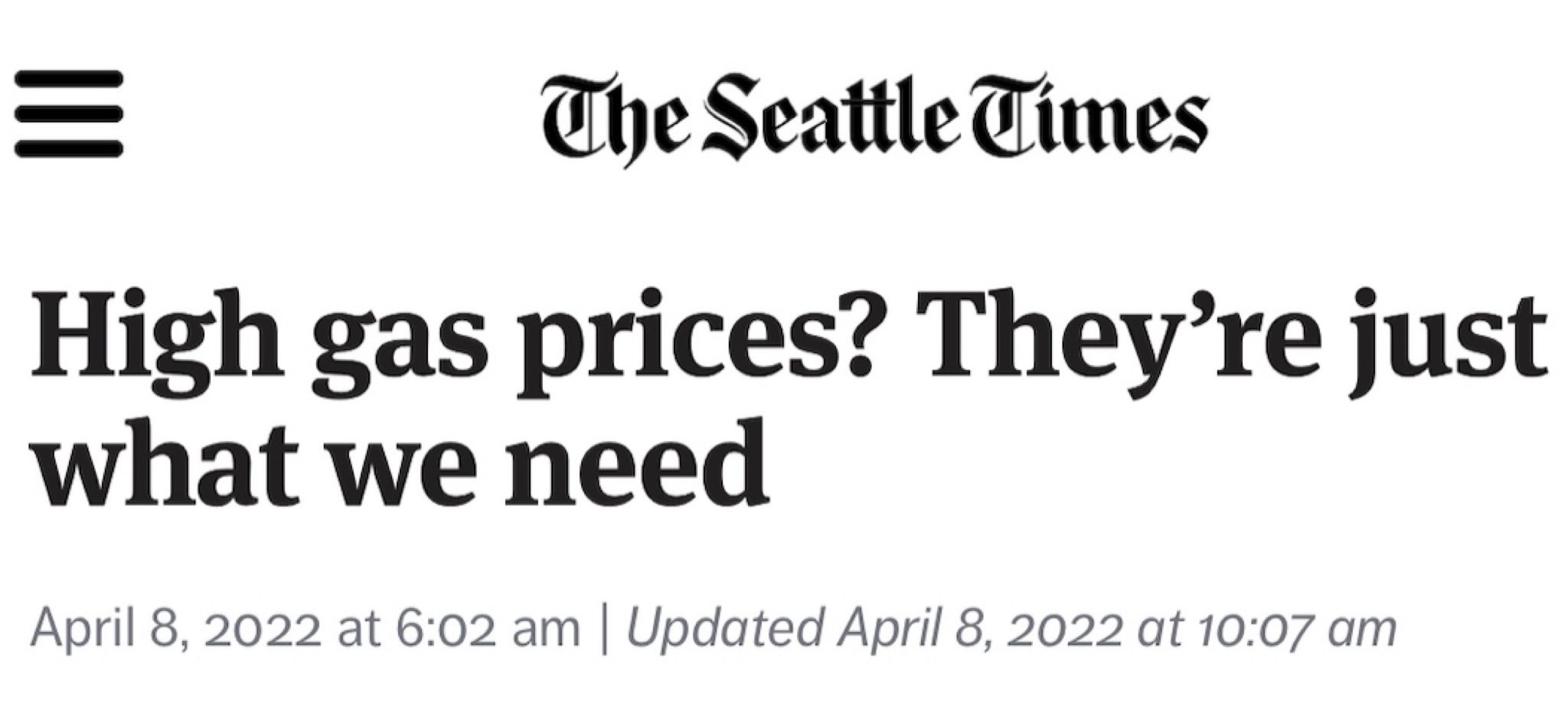the @nytimes forgot that dying of starvation also reduces your carbon footprint. https://t.co/V8qiKRkJOh
— zerohedge (@zerohedge) June 5, 2022
https://www.nytimes.com/2022/06/02/opinion/inflation-vegetarian-vegan.html
Culture & lifestyle journalist Annaliese Griffin writing in the New York Times:
Annaliese Griffin NYT June 2, 2022 Excerpt: If the current rate of food inflation holds and Americans don’t change their meat consumption habits, they will spend roughly $20 billion more on meat, poultry, fish and eggs over the next year than they did in 2020. … Inflation has the potential to drive welcome change for the planet if Americans think differently about the way they eat. While hunger and food insecurity are a very real problem in the United States and globally, middle- and upper-class Americans still have more choices at the grocery store than perhaps any food shoppers in history. Climate change has motivated some to eat less resource-intensive meat and more vegetables, grains and legumes, but this movement has not reached the scale necessary to bring needed change — yet.
…
A 2021 study in Nature found that animal products produce greenhouse gases at twice the rate of foods from plants. We should be paying attention to every ton of carbon dioxide that goes into the atmosphere — the same way shoppers are watching the cost of every addition to their grocery carts. …
One recent survey of 3,500 consumers found that while environmental concerns and animal rights would not persuade many shoppers to purchase meat substitutes more often, lower prices could.
…
Inflation resulting from the cost of fuel and feed, coupled with supply chain slowdowns, may make meat substitutes more affordable relative to traditional, factory-farmed meats. … Historically, cost has been a powerful force that has changed Americans’ diets. Yes, people in most cultures tend to eat more meat as they grow richer. But tighter budgets have also driven reductions in meat consumption.
…
In 1917, months after the country entered World War I, Congress passed the Lever Food and Fuel Control Act, which granted the government sweeping power over the food supply. Helen Zoe Veit, a professor of history at Michigan State University, quotes a contemporary critic who called it the “most radical” bill ever enacted by Congress in her book “Modern Food, Moral Food.” The Lever Act allowed the government to requisition food and prevent hoarding. It also created the Food Administration, headed by Herbert Hoover, more than a decade away from his presidency, who asked Americans to commit to one wheatless and one meatless meal each day, plus a wheatless Monday, a meatless Tuesday and a porkless Saturday (the pleasant alliteration of “Meatless Monday” evidently hadn’t occurred to him).
The Lever Act came at a time when the cost of living, including food prices, had risen significantly, by about a third from 1897 to 1916. Americans might have balked at Hoover’s top-down management — he was sometimes called the “food dictator” — but they were, by and large, swayed to join the cause, not least because they were already well versed in practicing the art of thrift when it came to food. Dr. Veit points to recipe books from the era that promoted egg-free cakes and meatless casseroles as a way to save money. There was “huge cultural buy-in to the idea that collectively, we could make small sacrifices — which is how people saw giving up meat — and we’d make the sacrifices in the name of a greater good and get something done,” Dr. Veit told me.
…
There is an inherent conflict in asking people to change their most personal habits because of climate change when government policy puts few restraints on polluting industries like oil, gas, coal and automobiles. Still, the answer isn’t either-or; it’s both-and. Rising prices for all kinds of consumer goods are exerting pressure on Americans, but our food spending can be modified more easily than what we pay at the gas pump. We do not have to become, overnight, a nation of vegetarians and vegans, but we could adjust what we eat to save both our pocketbooks and our planet.
…
Annaliese Griffin (@annalieseg) is a journalist who covers culture, lifestyle and health.
#
SHHHH…Climate change is a secret driver of inflation – Axios – Extreme weather worsened by climate change is a hidden cause of inflation, threatening to push up already high prices of everything from food and clothing to electronics. Why it matters: Heavy rainfall, flooding, heat waves and droughts erode agriculture, infrastructure and workers’ ability to stay on the job — all of which lead to supply-chain breakdowns and worker shortages. … Between the lines: Extreme weather is affecting both the supply and demand sides of the economy, Tamma Carleton, a professor of environmental economics at UC Santa Barbara, tells Axios. Research hasn’t yet quantified the exact impact extreme weather has on inflation. Some changes, such as the price of agriculture, are easier to pin down, while others — such as worker productivity — are harder to detect. When people take longer breaks to recover from heat exhaustion, or leave 15 minutes early, for example, it adds up day after day, Carleton said.
Former Obama U.S. Treasury official Mark Mazur says quiet part out loud: ‘We don’t want lower prices for fossil-fuel buyers, we prefer higher prices’ to achieve ‘climate change goals’ – Former Obama U.S. Treasury official Mark Mazur rejects the call for a gas-tax holiday because it “undercuts the administration’s climate change goals — where really to care about fossil-fuel consumption, we don’t want lower prices for fossil-fuel buyers, we prefer higher prices.”
Norwegian finance CEO Kjerstin Braathen: Energy transition will create energy shortages & inflation, but ‘that pain is actually worth it’ – Norwegian finance CEO Kjerstin Braathen: “We need to accept there will be some pain in the process. The pace that we need will open up for missteps. It will open up for shortages of energy, it will create inflationary pressures. And maybe we need to start talking about that, that pain is actually worth it because if we don’t there is no business case, there is no economy, there is no welfare.”
Biden praises high gas prices as part of ‘incredible transition’ away from fossil fuels
The 2012 NYT OpEd claimed a carbon tax with higher gas prices would result in not only “climate stability” but it would also prevent an “end [to] life as we know it.” … If Frank’s claims from 2012 were correct, the Earth’s climate should be in a perfect state of “stability” now given the massive increase in gas prices since President Joe Biden became president in 2021, a more than doubling of prices at the pump. If Frank’s claims from the New York Times were correct, President Biden has officially solved “climate change” with his higher gas prices.
Video of Obama seeking to bankrupt coal industry in 2008: – Flashback 2008: President Barack Obama in interview with the San Francisco Chronicle editorial board: “If somebody wants to build a coal-fired power plant, they can. It’s just that it will bankrupt them,” Obama said, responding to a question about his cap-and-trade plan. He later added, “Under my plan … electricity rates would necessarily skyrocket.”
Triple price of gas to save planet, UN climate expert Thomas Stocker argues – Meet the man who wants to impose his warmist religious beliefs on you! – Canadians may abhor the rising price of gasoline, but Thomas Stocker suggests the planet might be better off if it soared to “three to four” times its current level. “This is scandalous, I know,” said Stocker, adding sky-high gasoline could help slow the climate change which world leaders have declared one of the greatest challenges of our time.
Inflation divide: The wealthy splurge, the poorest pull back – (AP) — Americans at the low end of the income rung are once again struggling to make ends meet. A confluence of factors — the expiration of federal stimulus checks and surging inflation on staples like gas and food — are driving an even bigger wedge between the haves and have-nots. While wealthier shoppers continue to splurge, low-income shoppers have pulled back faster than expected in the past two months. They’re focusing on necessities while turning to cheaper items or less expensive stores. And they’re buying only a little at a time. It’s a reversal from a year or so ago when low-income shoppers, flush with money from the government and buoyed by wage increases, were able to spend more freely.
WEF elites: countries must reject sovereign interests and prioritize ‘global agenda’
Jon Talton, columnist for the Seattle Times: “The biggest paradox of the moment is Americans complaining about high gasoline prices while climate change is growing worse.” … “Yet carbon — of which Happy Motoring is among the worst offenders — needs to be priced high enough to keep it in the ground instead of burning it into the atmosphere. This is essential to preventing global catastrophe.” … “Meanwhile, most Americans will keep driving, complaining about gasoline prices and acting as bystanders to the growing costs of climate change.”
Biden Commerce secretary says the ‘brutal reality’ is that there ‘isn’t very much more to be done’ on gas prices – Says it’s Putin’s fault – “Unfortunately, that is the brutal reality,” Commerce Secretary Gina Raimondo said in response to CNN’s Kate Bolduan saying there’s not much action left that President Joe Biden can take. She continued, “You know, this is, in large part, caused by (Russian President Vladimir) Putin’s aggression. …the reality is that there isn’t very much more to be done.”
Watch: Biden Commerce Sec. declares ‘existential threat’ of climate more important than clothing kids -‘Forget about clothes on their back, they’re not gonna be able to have a life if we don’t deal with climate change’ – Biden’s Commerce Secretary Gina Raimondo answered questions from Congress about the budget for Fiscal Year 2023. Virginia congressman Ben Cline asked: “A 24% increase over FY21 levels for NOAA doesn’t really help families put food on the table or clothes on the back at a time when inflation is at a forty-year high. Can you talk about how this massive allocation of funds helps to combat inflation, or deal with supply chain issues that you say are so important?”









